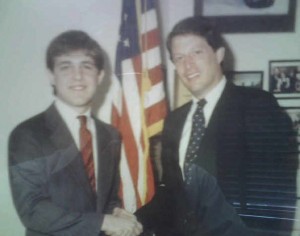 Today marks the 25th anniversary of this Jewish pischer’s baptism into politics.
Today marks the 25th anniversary of this Jewish pischer’s baptism into politics.
I’d been working for then Tennessee Senator Al Gore’s underdog bid for President for months, but March 8, 1988, “Super Tuesday,” was considered the potential game changer, two decades before “game changer” became a political cliché.
Since Lyndon Johnson’s 1964 landslide, Democrats had been wandering in the Electoral College desert, only winning one Presidential election in 1976, in the aftermath of the GOP Watergate meltdown. Our problems had been identified by LBJ himself when he prophesized that Democrats “have lost the South for a generation,” upon his courageous signing of the Civil Rights Act of 1964. Many blamed a leftward lurch by the party during the final years of Vietnam and the emergence of its George McGovernite wing, unfairly stereotyped as a bunch of hippies favoring “acid, amnesty and abortion.”
I had signed up for the 39-year-old Gore’s campaign because of his thoughtful and progressive views on arms control and the environment. But I also believed that as a more moderate Southerner, he could help the Democratic Party end its losing streak and take back control of the White House.
Behind the scenes, party moderates and pragmatists had been working on a plan to facilitate the election of a more electable nominee. At the core was the creation of “Super Tuesday” — a day with 21 primaries taking place, including all of the Southern states. The theory was that a Democratic nominee who could win the Southern primaries could win the nation in the fall.
As the returns came in 25 years ago today, I excitedly sat in the campaign war room — a 20 year old surrounded by a veteran group of 20- and 30- somethings. (My great friend from that campaign — and No Labels co-founder, Nancy Jacobson — calls me to this day the “campaign mascot.”)
I was in charge of keeping track of the vote tallies on the war room chalkboard. (Yes, this is before whiteboards and erasable markers, kids.) Things looked very promising when Al Gore steamrolled through the Upper South: his home state of Tennessee, Arkansas, North Carolina, Oklahoma, and best of all, my old Kentucky home. (Side note: The Kentucky state director for the campaign is to this day, my best frenemy, George Phillips (read about him here). This is the only time in history George has ever celebrated a Kentucky victory — he is, natch, a Dukie.)
But, we were losing everywhere else: Jesse Jackson took the Deep South, while Mike Dukakis took the big prizes, Texas and Florida, where liberal voters dominated the primary electorate. While Gore stayed in the race a few more weeks, he was after “Super Tuesday” dead man walking. Dukakis ultimately won the nomination, but as many of us feared, was branded too liberal, and lost in the fall to the first George Bush. But not for a lack of me trying:
Well, we heard from Gore later, when he joined a fellow Southerner on the 1992 Democratic presidential ticket that finally turned the party’s fortunes around.
So while March 8, 1988 ended up on a sour note, it was a day that changed our country for the better.
And it began my love affair with politics, which continues to this day, albeit from outside any war rooms.









Leave a Reply